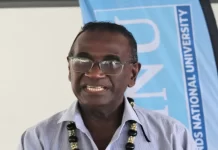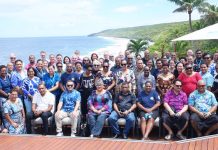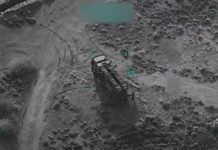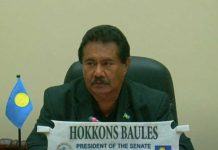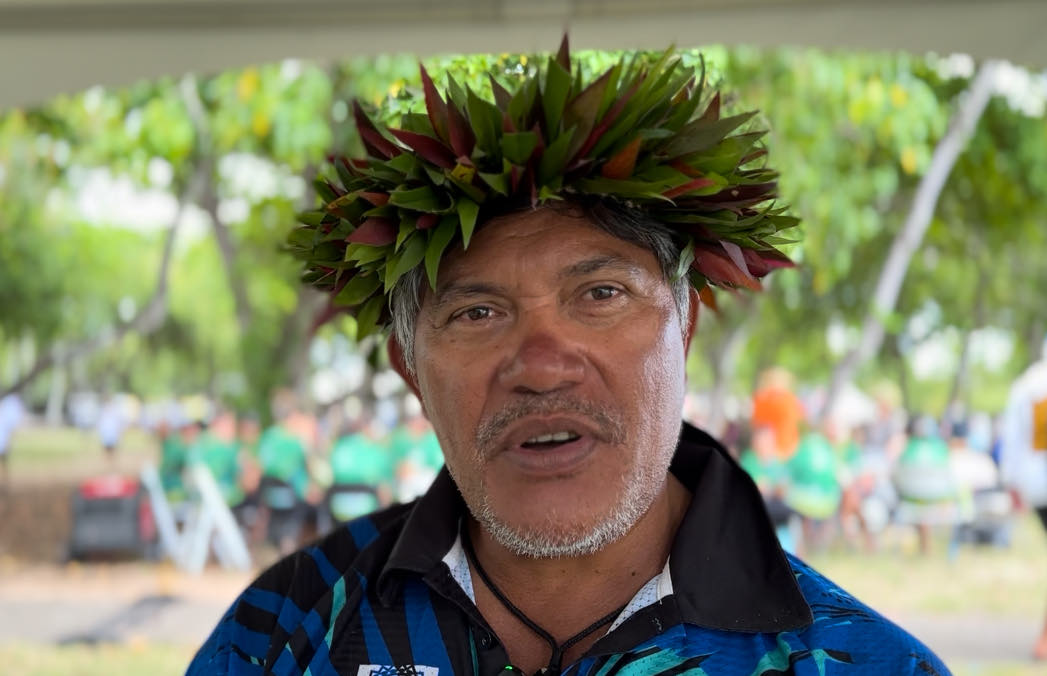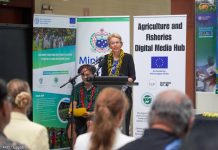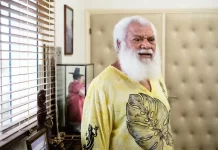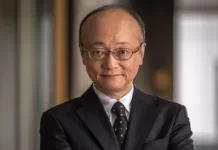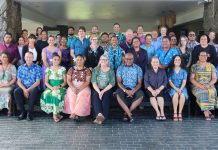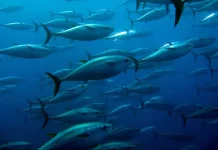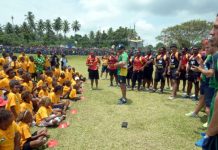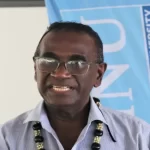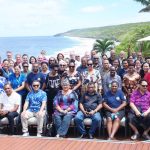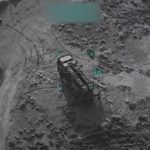In 2024 in Honolulu, the most venerated participants of the 13th Festpac are the voyagers who have arrived by reading the stars, the waves and winds, to close the circle begun by Hawaii’s Hokule’a canoe in the mid 70s.
In 1992 at the Festpac Cook Islands, he was the Mauke vaka navigator sailing into Avana for the first ever vaka arrivals marking the opening of the Festival of Arts. More than 30 years later, Cook Islander Peia Patai is widely lauded as a Pwo master navigator, bringing the Marumaru Atua and a young crew into the opening ceremonies of the 13th Festpac in Hawaii.
Patai has trained on the first traditional voyaging canoe, the Hokule’a, which led to the resurgence and rebirth of travelling using the stars and ocean currents to show the way.
He shared insights shortly after the opening ceremonies for the Festpac Hawaii after a spectacular flotilla of vaka – including the Marumaru Atua crewed by a blended crew of veterans and handpicked youth from Mauke and Aitutaki, were welcomed at Kualoa Beach. As the festival ends, Patai will await the wind conditions required to lead another crew and the Marumaru Atua home.
Q- Peia, tell us about where you were in 1992 when the vaka ceremony first started at the Festpac in the Cook Islands.
Peia: I sailed to the Maire Nui on the Mauke Vaka. I was the navigator on that canoe, in 1992- to Avana, that was the beginning of my traditional voyaging life.
Q: What is so important about connecting to that life for us as people of the Ocean?
Peia: I think is more an urgency for us. Our culture in traditional sailing, it’s really not as good. I also that for us, its where the pito of our culture is, the canoe, we talked about the canoe, we talked about everything else, and the knowledge is slowly disappearing for our young people, especially with the technology of these days- its hard, so theres an urgency for us to start teaching and pass it on to our young so that it will never disappear again.
Q: What is the best way that you have found to teach our young people to appreciate and know the ocean?
Peia: Its actually taking them sailing. And I think it’s the only way that we keep the canoe alive is just by sailing. Taking that message out, going to the outer islands, touch base with our young kids there, and then making them understand that our culture is very important than anything else.
Q: What have been your wow moments? It’s been a long while, a generation now since 1992.
Peia: I mean, just seeing the young ones go through it, that’s a big wow. On this trip that I came, I brought a whole lot of Outer Islands kids –Mauke, Mitiaro, Aitutaki, and seeing them go through it, they are very young. But really, really awesome. I’m so proud of them. So that was one big Wow moment for me. And seeing that happening is really assuring us that that’s it will be healthy, our culture will be healthy.
Q: You seem to have found a family of master navigators– Describe that family.
Peia: We are tight. We are really tight. We meet every Wednesdays for we’ve been meeting for five years. And it’s hard to break up and we support each other. We draw energies from each other. And I think that’s very, very important for us to be tight like that. So that it makes sure that that traditional knowledge and traditional canoe culture stays alive.
Q: In an interview you gave recently you talked about the impact of climate change.
Peia: You can really see it. Its actually quite physical. Just like us when we left Rarotonga. This El Nino weather has affected a lot of the wind directions. So it was difficult for us to get into the equator itself. Very difficult. Wind on the nose all the time, but when we got into the Northern hemisphere, then we started to enjoy the hard work that we did. So you know, traditional sailing now, we have to adapt the modern ways of weather-telling. Things have changed. It’s not like before anymore. So I keep on telling our lot, we have to work together with the technologies and our traditional knowledge, working together, is the only way for us to move forward to make sure that we are safe. So climate change has a lot to play.
Q: Coming into shore here, what went through your mind?
Peia: Oh my goodness, I didn’t expect what actually happens but seeing our people there, tears flows inside. It’s always hard for me to get physical tears but it’s flowing inside with excitements and happiness to see. They always put on a show. A real one, and that’s what we did.
They didn’t even bother with a pa’ata, they just lifted you – yes the fact that they just lifted me up, I don’t like doing that but you know, I have to respect what the people did. So, thank you so much everyone.
Q: Where do you see traditional navigation in the future. Especially you know, in future festivals with the impact of everything modern life and everything that you’ve talked about here.
Peia: We are working so hard in the Cooks now. We’ve got two canoes now. We’ve Marumaru Atua and we got Paikea, so we are working so hard to keep that moving. I see a great future for us, a very great future. n one once when we got back here. So you know we can so much good to get that moving. I see it. It’s a great future for us, a very great future but it depends on myself and Tua to get to work.
Q: Who have been some of your mentors when you think of your journey? Who have been those who influenced you?
Peia: My goodness. My teacher– Nainoa Thompson. He has been there to guide us, contact us, So he’s always there. His teacher papa Mau (Pialug) has been another good mentor for us and keep us going. I mean, without these teachings, we wouldn’t be here today. Without Him, and without Hokulea, we would not be out here today. So all those canoes that you see out there – those are all Hokulea’s babies.
Q: What is the biggest advice you would give for young people and any people of any age looking at all this?
Peia: Appreciate your culture, you know, and love it. And continue to teach. –#FestpacVoices.


